Shows

The Free Will ShowEpisode 95: Experimental Philosophy and Free Will with Eddy NahmiasIn this episode, we talk with Eddy Nahmias about the experimental philosophy of free will and his own compatibilist view.Eddy's Website: https://eddynahmias.com/Eddy's paper (with Nadelhoffer and Morris): Is Incompatibilism Intuitive?Eddy's paper with Oisin Deery: Why the Manipulation Argument Fails: Determinism Does Not Entail Perfect PredictionTwitter: https://twitter.com/thefreewillshowInstagram: https://www.instagram.com/thefreewillshow/?hl=enFacebook: https://www.facebook.com/The-Free-Will-Show-105535031200408/
2025-03-1759 min
An Intro to Anthro with 2 HumansEpisode 30: Free Willy or Free Won’ty, Free Will, Will Power and the Real Reason Why Little Willy Won’t Go HomeDo you have free will or is everything you do pre-determined? You’ll find out if you tune in to this episode OR you’ll find out if you don’t tune in to this episode.
Episode 30: Free Willy or Free Won’ty: Free Will, Will Power, and the Real Reason Why Little Willy Won’t Go Home
An Intro to Anthro with 2 Humans
Human Number One, John McCray, and Human Number Two, John Lehr, re-assess what it means to be human.
www.intro2anthro.podbean.com
https://www.facebook.c...
2024-01-081h 17
An Intro to Anthro with 2 HumansEpisode 30: Free Willy or Free Won’ty, Free Will, Will Power and the Real Reason Why Little Willy Won’t Go HomeDo you have free will or is everything you do pre-determined? You’ll find out if you tune in to this episode OR you’ll find out if you don’t tune in to this episode.
Episode 30: Free Willy or Free Won’ty: Free Will, Will Power, and the Real Reason Why Little Willy Won’t Go Home
An Intro to Anthro with 2 Humans
Human Number One, John McCray, and Human Number Two, John Lehr, re-assess what it means to be human.
www.intro2anthro.podbean.com
https://www.facebook.c...
2024-01-081h 17
SkravleklassenCommon SenseSturla rightfully got some friendly critique from Ole Martin Moen (Oxford/Oslo Met) for only having skeptics on discussing free will and moral responsibility and took it as a challenge. In this episode he is talking to philsophy professor Eddy Nahmias (Georgia State) about the compatibalist view, and about the view that one can be punished solely to inflict harm on wrongdoers. Eddy is explaining this view in a most sympathetic and commonsensical manner and as it turns out the two fonds more common ground than points of contention. As promised by his «friends» from the skeptic side the conversation wi...
2022-05-2355 min
Plato's CaveEp. 28 - Eddy Nahmias: Neuroscience as a (Non) Threat to Free WillI spoke with the philosopher Eddy Nahmias about his work in Free Will and Moral Responsibility. What type of freedom do we have, or want to have? And does the increasing understanding of the brain threaten our sense of acting freely? Find out all this and more in my talk with Eddy. We use two paper of his as background for the conversation: "Your Brain as the Source of Free Will Worth Wanting" and "Why ‘Willusionism’ Leads to ‘Bad Results.’"
Here's any links you'll need to dive deeper:
https://eddynahmias.com/
https://philpapers.org/rec/NAHYBA
2022-02-1043 min
Free Will MattersE4 Eddy NahmiasEddy Nahmias
Professor and chair of the Philosophy Department at Georgia State University and associate faculty member of the Neuroscience Institute at Georgia State University. His research is devoted to the study of human agency (what it is, how it is possible, and how it accords with scientific accounts of human nature) focusing on debates about free will and moral responsibility. Eddy is co-editor of Moral Psychology: Historical and Contemporary Readings (Wiley-Blackwell) and his work has been published in Philosophical Studies, Philosophy and Phenomenological Research, and Cognition, among others.
2020-06-1709 min
Very Bad WizardsTalking to Your (Alternate) Self [Ted Chiang's "Anxiety is the Dizziness of Freedom"]David and Tamler dive back into the Ted Chiang well and explore the fascinating world described in "Anxiety is the Dizziness of Freedom." What if you could interact with alternate versions of yourself - versions that made different choices, had different jobs, or different partners? Would you get jealous of your other selves if they were more successful? Would you want them to be unhappy so you could feel better about your own choices and path? If your alternate self was in a good relationship with a woman, would you try to track down the version of that woman...
2019-10-011h 40
Center for Mind, Brain, and CultureLecture | Eddy Nahmias | I’m Glad ‘My Brain Made Me Do It’: Free Will as a Neuropsychological Success Story‘Willusionists’ argue that science is discovering that free will is an illusion. Their arguments take a variety of forms, but they often suggest that if the brain is responsible for our actions, then we are not. And they predict that ordinary people share this view. I will discuss some evidence that most people do not think that free will or responsibility conflict with the possibility that our decisions could be perfectly predicted based on earlier brain activity. I will consider why this possibility might appear problematic but why it shouldn’t. Once we define free will properly, we see that neuro...
2014-09-171h 07
Very Bad WizardsYou, Your Self, and Your Brain (With Eddy Nahmias)Our streak of very special guests continues! Philosopher Eddy Nahmias joins the podcast to us why people mistakenly think they're not morally responsible, and how his new study casts doubt on Sam Harris's "pamphlet" on free will. Eddy also describes his new project (with Toni Adleberg and Morgan Thompson) on why women leave philosophy. Plus Dave and I discuss some reasons for having children, and eat a little Partially Examined Life crow. Links "Name five women in philosophy. Bet you can't." Tania Lombrozo, [npr.og] "Do Women Have Different Philos...
2013-07-221h 22
Very Bad WizardsBrains, Robots, and Free Will (Free Will and Morality Pt. 1)Dave and Tamler start out talking about the new wave of skepticism about free will and moral responsibility in the popular press from people like Sam Harris and Jerry Coyne. Neuroscience figures heavily in their arguments, but Dave and Tamler agree that neuroscientific data adds little of substance to the case other than telling us what we already know: human beings are natural biological entities. Dave also accuses Tamler of being a hipster philosopher for abandoning a view once it got popular. Next, we talk about what kind freedom we need to have in o...
2012-08-301h 10